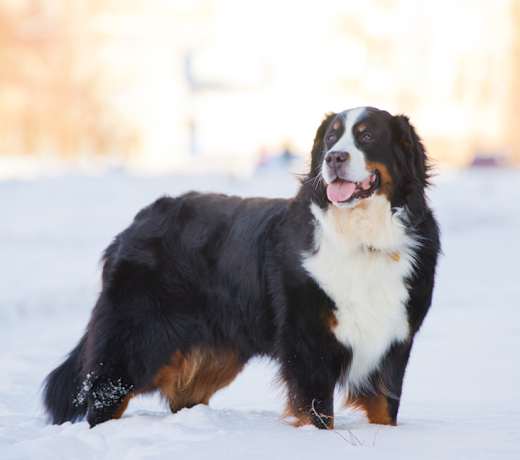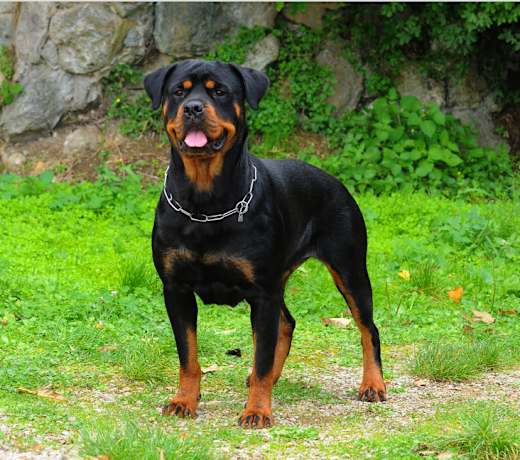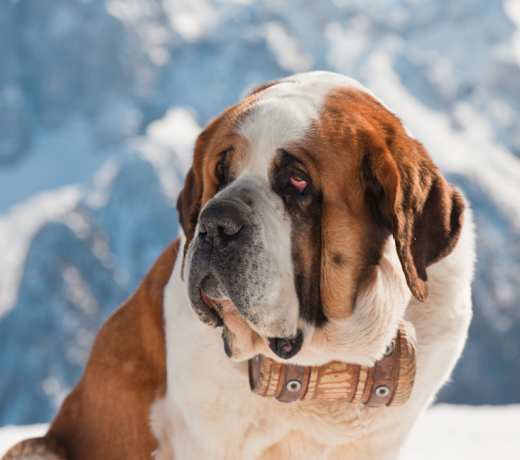Greater Swiss Mountain Dogs are extra-large and sturdy dogs. They have a broad, well-muscled body that is longer than it is tall. They typically weigh between 59 to 110 pounds and stand about 23 to 28 inches tall at the shoulder. Their robust build gives them a powerful appearance, making them great working dogs.
Greater Swiss Mountain Dog
Breed Type: Working
Common nicknames: Swissy, GSMD
Coat: Smooth
Hypoallergenic: No, they will likely trigger allergies.
Temperament: Gentle, affectionate, loyal, adaptable
Life expectancy: 8-11 years
Color & patterns: Black and tan
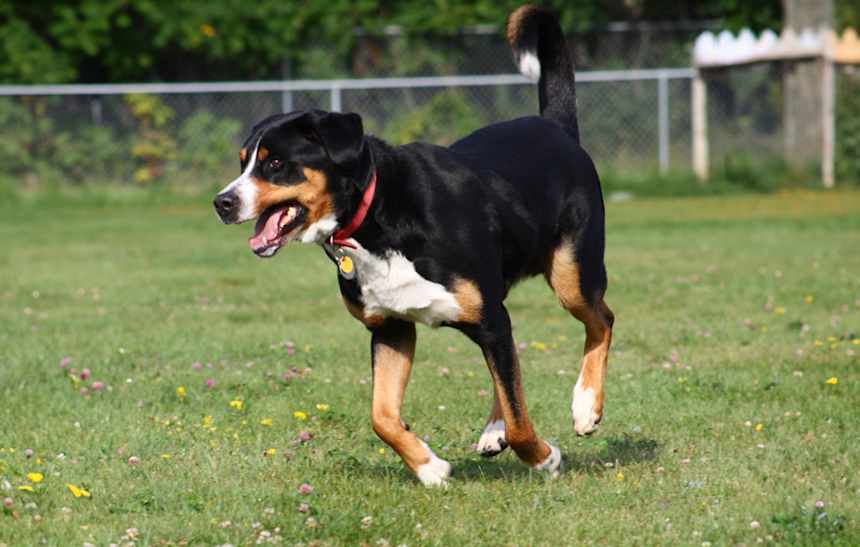
The Greater Swiss Mountain Dog is a charismatic and lovable giant who will fill your life with boundless joy. These pups are known for their friendly and outgoing natures, making them wonderful playmates and cherished family members. Their striking tri-colored coats, intelligence, and eager-to-please attitudes make them quick learners and versatile working dogs. Originally bred as hard-working farm dogs, Greater Swiss Mountain Dogs have a rich history of herding, guarding, and being the most stylish droolers in town. Whether it’s a long hike, a game of fetch, or simply snuggling on the couch, Greater Swiss Mountain Dogs bring a sense of adventure and warmth to every moment. With plenty of mental and physical stimulation, you’ll have an amazing friend with the Greater Swiss Mountain Dog.
Greater Swiss Mountain Dog characteristics
Learn about about Greater Swiss Mountain Dog basics like their fur colors, shedding levels, how much grooming they need, and other Greater Swiss Mountain Dog facts.
Average height
23-28 inches (58.4-71.1cm)
Average weight
59-110 pounds (26.8-49.9 kg)
Average lifespan
8-11 years
Exercise needs
Grooming needs
Full-grown size
Good with cats
Good with kids
Training aptitude
When do Greater Swiss Mountain Dogs stop growing?
Greater Swiss Mountain Dogs usually reach their full height by around 12 months of age, but they may continue to fill out and gain muscle mass until they are about two to three years old. Growth rates can vary individually, so it’s important to monitor their diet and exercise during this time to support healthy development.
Do Greater Swiss Mountain Dogs shed?
Yes, Greater Swiss Mountain Dogs do shed. They have a double coat, which means they shed year-round, with more significant shedding occurring during seasonal changes, particularly in spring and fall. The Greater Swiss Mountain Dog doesn’t require much grooming as their coat does not become matted. A regular brushing will help keep the shedding at bay.
What colors do Greater Swiss Mountain Dogs come in?
Greater Swiss Mountain Dogs have a striking tricolor coat in black, white, and red. The primary color is black, with rust markings on the face, legs, and chest, as well as white markings on the face, chest, and legs. This color pattern is standard for the breed.
Greater Swiss Mountain Dog temperament
Learn about about the Greater Swiss Mountain Dog temperament and how well they fit into your lifestyle, home environment, and family.
Do Greater Swiss Mountain Dogs cuddle?
Yes, Greater Swiss Mountain Dogs often enjoy cuddling. They have an affectionate nature and love to be close to their families. Many will seek out cuddles and enjoy being petted. Their large size makes them great lap-dogs despite their bulk.
Are Greater Swiss Mountain Dogs friendly?
Yes, Greater Swiss Mountain Dogs have a friendly and sociable nature. They are typically affectionate with their families and are generally welcoming to strangers. Their gentle temperament makes them great companions for families, including children. Proper socialization from an early age helps ensure they remain friendly and well-adjusted.
Are Greater Swiss Mountain Dogs good with kids?
Yes, Greater Swiss Mountain Dogs are known to be especially gentle with children, and their affectionate energy makes them good and patient playmates for them.
As with any breed, it is recommended that your child is always supervised when interacting with your Greater Swiss Mountain Dog to keep both the child and dog safe. Teaching children how to properly approach and handle dogs is crucial to ensure positive experiences for both the dog and the child, as is teaching dogs how to interact gently with children – especially this breed due to their large, powerful stature.
Are Greater Swiss Mountain Dogs good with cats?
Greater Swiss Mountain Dogs can have a high prey drive, so they might not be the best friend to your cat. Of course, each dog (and cat) has their own preferences and temperament. Early socialization and training can help them coexist peacefully with cats. It’s important to supervise their interactions, particularly at first, to ensure everyone feels safe. Cats who are part of your Greater Swiss Mountain Dog’s “pack” tend to get along with them better than “outside” cats.
Do Greater Swiss Mountain Dogs bark?
Yes, Greater Swiss Mountain Dogs can bark, but they are not known for being excessive barkers. Greater Swiss Mountain Dogs are alert barkers but they also have a “calling bark,” which they use to “call” their parents to attention. As you might guess, given their size, their bark is loud. As with any dog, they can be discouraged from barking as frequently with proper training and exercise.
Are Greater Swiss Mountain Dogs good family dogs?
Yes, Greater Swiss Mountain Dogs are good family dogs. They are very affectionate, loyal, social, and adaptable dogs that can thrive in a variety of living spaces despite their large size. Because of their powerful stature, they will do best with an experienced dog parent who knows how to properly socialize this dog to family life. They tend to be loyal and protective, making them great companions for families. Their playful demeanor and patience with children also contribute to their suitability as family pets. They need moderate daily exercise and are happiest when fully integrated into family life.
Are Greater Swiss Mountain Dogs easy to train?
Yes, Greater Swiss Mountain Dogs are intelligent and eager to please, which can make them relatively easy to train. However, they are also independent and can be stubborn, and even if a certain dog breed is known to be easy to train, training any dog requires a long-term commitment.
They require a patient, positive trainer who will give lots of motivation in the form of food and praise. Consistent, positive reinforcement training methods work best, along with early socialization, to help them become well-rounded adults. Patience and regular practice are key, especially for more challenging commands.
Are Greater Swiss Mountain Dogs smart?
Yes, Greater Swiss Mountain Dogs are considered intelligent dogs. They are quick learners and can pick up commands and tasks fairly easily, especially when motivated by praise or rewards. Their intelligence, combined with their eagerness to please, makes them capable of learning a variety of skills and commands. However, they can also show some independence, so consistent training and socialization are important.
Can Greater Swiss Mountain Dogs be left alone?
Greater Swiss Mountain Dogs can tolerate being left alone for short periods, but they are social animals and thrive on companionship. Long periods of isolation can lead to boredom and potentially result in destructive behaviors. It’s best to gradually acclimate them to being alone and provide mental stimulation, such as toys or puzzles, to keep them occupied.
Do Greater Swiss Mountain Dogs slobber?
Yes, Greater Swiss Mountain Dogs can slobber, especially after drinking water or when they’re excited. Their large jowls can contribute to drooling, but the amount can vary from dog to dog. Regular grooming and keeping their water bowl clean can help manage any slobber.
Are Greater Swiss Mountain Dogs good with other dogs?
Yes, Greater Swiss Mountain Dogs are generally good with other dogs, especially if they are properly socialized from a young age. They tend to be friendly and can get along well in multi-dog households. However, individual personalities can vary, so gradually introducing them to other dogs and monitoring interactions is always a good idea.
Greater Swiss Mountain Dog history
Learn about where the Greater Swiss Mountain Dog came from.
Where are Greater Swiss Mountain Dogs from?
The Greater Swiss Mountain Dog originated in the Swiss Alps and was a result of a systematic breeding of Sennenhunds. In 1908, Franz Schertenleib entered what he thought was a larger, short-haired Bernese Mountain Dog in a dog show, and the officiant Dr. Heim declared it a new breed of dog and dubbed him the “Greater Swiss Mountain Dog” then and there.
How many types of Greater Swiss Mountain Dogs are there?
The Greater Swiss Mountain Dog is one of four types considered under the bracket of “Sennenhund,” or Swiss dogs of herders and dairymen. They are the oldest of the four types, which includes the Greater Swiss, Bernese, Appenzeller, and Entlebucher. The Greater Swiss Mountain Dog was first recognized by the American Kennel Club in 1995. Though tough and powerful, this breed is also gentle and sweet.
How long do Greater Swiss Mountain Dogs live?
A healthy Greater Swiss Mountain Dog will typically live about eight to 11 years. Regular veterinary check-ups and a healthy lifestyle can help improve their quality of life.
Greater Swiss Mountain Dog health
Learn about about the Greater Swiss Mountain Dog health outlook and what diseases they may be prone to at various stages of their life.
Do Greater Swiss Mountain Dogs have health issues?
Greater Swiss Mountain Dogs are a robust breed with fewer health problems than other breeds their size. However, they still may be prone to some health issues.
What diseases are Greater Swiss Mountain Dogs prone to?
Some health issues Greater Swiss Mountain Dogs may be prone to include:
Hip and/or elbow dysplasia: Hip and elbow dysplasia are two of the most common skeletal diseases seen in dogs. They are similar diseases in which either the hip or elbow joint has grown abnormally or is misshapen. The abnormal shape prevents the joints and sockets from properly meeting one another, resulting in rubbing and grinding instead of sliding smoothly. Unlike in hip dysplasia, where the main problem is joint instability, the abnormalities seen in elbow dysplasia often result in pieces of bone and/or cartilage breaking loose and irritating the joint tissues. Over time, the rubbing from dysplasia can cause a variety of issues, such as pain, lameness, and secondary osteoarthritis. Surgery can be done to fix the joint if diagnosed before the onset of arthritis. If you are rescuing a Greater Swiss Mountain Dog, have them checked out by a vet to see if they have or are prone to getting dysplasia so you know what she will be able to handle in terms of activities and exercise.
Eye disorders: Greater Swiss Mountain dogs are susceptible to a variety of eye disorders, including distichiasis, an abnormal growth of eyelashes on the margin of the eye (the extra eyelashes and abnormal location result in irritation to the eye); cataracts, a common eye condition that causes cloudiness in the eye and obstructs vision; and entropion, a genetic defect where one or both eyelids are inverted or roll inward and rub on the surface of the eye.
Patellar luxation: Also known as slipped kneecaps, patellar luxation is a common problem in many dog breeds. It occurs when slight abnormalities cause the knee joint to slide in and out of place. This can cause pain and occasional lameness. Surgery is available for severe cases, although many dogs lead normal lives without treatment.
Osteochondrosis dissecans (OCD): This condition causes improper growth of the cartilage in the joints. It’s usually observed in the elbows but has also been seen in the shoulders. The lack of cartilage properly covering the bone creates stiffness in the joint to the point that a dog becomes unable to bend her elbow. High-protein food and foods designed to increase growth (such as puppy formulas) may contribute to the development of osteochondrosis dissecans.
Splenic torsion: This condition occurs when the spleen, an organ that removes excess blood cells from the body and supports the immune system, twists on itself. The twisted spleen then expands and fills with blood. This can happen suddenly or over a period of time. Take your dog to the vet right away if you notice any of these symptoms: vomiting, fever, pale gums, red or brown urine, increased heart rate, and abdominal tenderness.
Others: Urinary incontinence; gastric dilatation-volvulus, a sudden, painful, and life-threatening swelling and twisting of the abdomen; seizures; and self-limiting lameness or temporary limp (known as panosteitis).
Are Greater Swiss Mountain Dogs hypoallergenic?
No, Greater Swiss Mountain Dogs are not hypoallergenic. They have a double coat that sheds, which can trigger allergies in sensitive individuals. If you’re looking for a dog better suited for allergy sufferers, you might want to consider breeds specifically bred to be hypoallergenic.
Do Greater Swiss Mountain Dogs smell?
Greater Swiss Mountain Dogs can have a doggy odor, especially if they haven’t been groomed regularly or if their coat gets wet. Regular bathing, brushing, and proper ear care can help minimize any smells. Their double coat can trap dirt and moisture, so keeping them clean is important for their overall hygiene.
Popular Greater Swiss Mountain Dog mixes
A few common Greater Swiss Mountain Dog mixes include:
Corswiss (Greater Swiss Mountain Dog + Pembroke Welsh Corgi)
Greater Swiss Mountain Dane (Greater Swiss Mountain Dog + Great Dane)
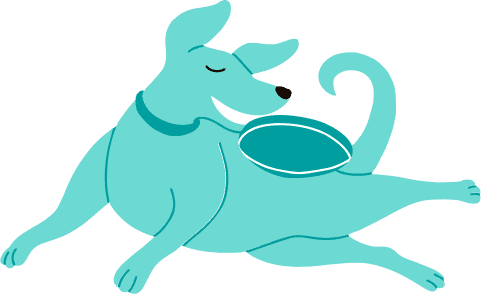
Find Greater Swiss Mountain Dog puppies near you
Adopting a Greater Swiss Mountain Dog
Learn about acquiring a Greater Swiss Mountain Dog - the pros and cons of adopting versus going through a breeder, and associated costs.
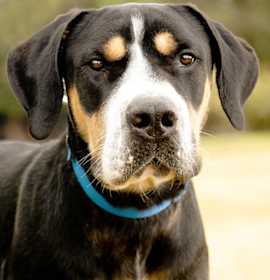
Milton
Greater Swiss Mountain Dog Coonhound (Unknown Type)
Male, 9 yrs 1 mo
Marina del Rey, CA
Good with dogs
House-trained
Spayed or Neutered
Shots are up-to-date

Daisy
Greater Swiss Mountain Dog
Female, young
Manhattan Beach, CA
Good with dogs
Good with cats
Needs experienced adopter
House-trained

Milton
Greater Swiss Mountain Dog Coonhound (Unknown Type)
Male, 9 yrs 1 mo
Marina del Rey, CA
Good with dogs
House-trained
Spayed or Neutered
Shots are up-to-date

Daisy
Greater Swiss Mountain Dog
Female, young
Manhattan Beach, CA
Good with dogs
Good with cats
Needs experienced adopter
House-trained

